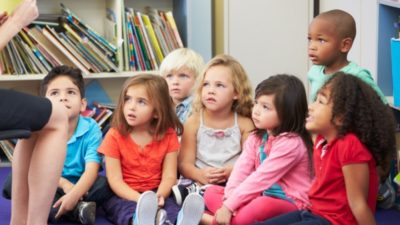Research -- StepUp to Learn
Childhood aggression linked to deficits in executive function
Primary school children with reduced cognitive skills for planning and self-restraint are more likely to show increased aggression in middle childhood.
Eating together as a family helps children feel better
Children who routinely eat their meals together with their family are more likely to experience long-term physical and mental health benefits, a new study shows
Behavior problems and concussion in young children
Concussions are a major public health problem because of their high number in adolescents and athletes who practice contact sports. Their frequency is increased in preschool children since they have a more blurred notion of danger and are therefore more likely to be injured.
Brain Imaging Predicts Language Learning in Deaf Children
MRI brain scans can predict language improvement after a cochlear implant, laying the foundation for creation of brain specific therapy.
A ‘touching sight’: How babies’ brains process touch builds foundations for learning
Touch is the first of the five senses to develop, yet scientists know far less about the baby’s brain response to touch than to, say, the sight of ...
China’s scholastic success could begin with storybooks, research suggests
There is a widely held perception – and some research to affirm it – that East Asian schools outperform schools in North America. A recent study published by UC Riverside psychologist Cecilia Cheung skirts the link between storybooks and school performance, but asserts that the lessons taught in Chinese schools could start early.
Bilingual preschoolers have better impulse control, study finds
Preschoolers who speak two languages show less impulsiveness than their single-language peers, say University of Oregon researchers whose project was seeded after they met in a graduate psychology course.
How Dance Can Help Students in STEM Disciplines
A proof-of-concept study at North Carolina State University finds that participation in dance programs helps students – including those in science, technology, engineering and mathematics (STEM) disciplines – develop skills such as creativity and persistence that benefited them in the classroom and beyond.
Study Finds Attending a Middle vs. a K-8 School Matters for Student Outcomes
Students who attend a middle school compared to a K-8 school are likely to have a lower perception of their reading skills, finds a new NYU Steinhardt study.
Getting emotional after failure helps you improve next time, study finds
New research led by a University of Kansas marketing professor has found emotional responses to failure rather than cognitive ones are more effective at improving people's results for the next time they tackle the next related task.
Kids praised for being smart are more likely to cheat
An international team of researchers reports that when children are praised for being smart not only are they quicker to give up in the face of obstacles they are also more likely to be dishonest and cheat. Kids as young as age 3 appear to behave differently when told “You are so smart” vs “You did very well this time.”
Do you read stories to kids? Ensure moral lessons have greater impact with these types of books
A study from the Ontario Institute for Studies in Education (OISE) at the University of Toronto shows kids aged 4-6 learn social lessons, like sharing or telling the truth, most effectively from a certain type of book. The results may surprise you.












